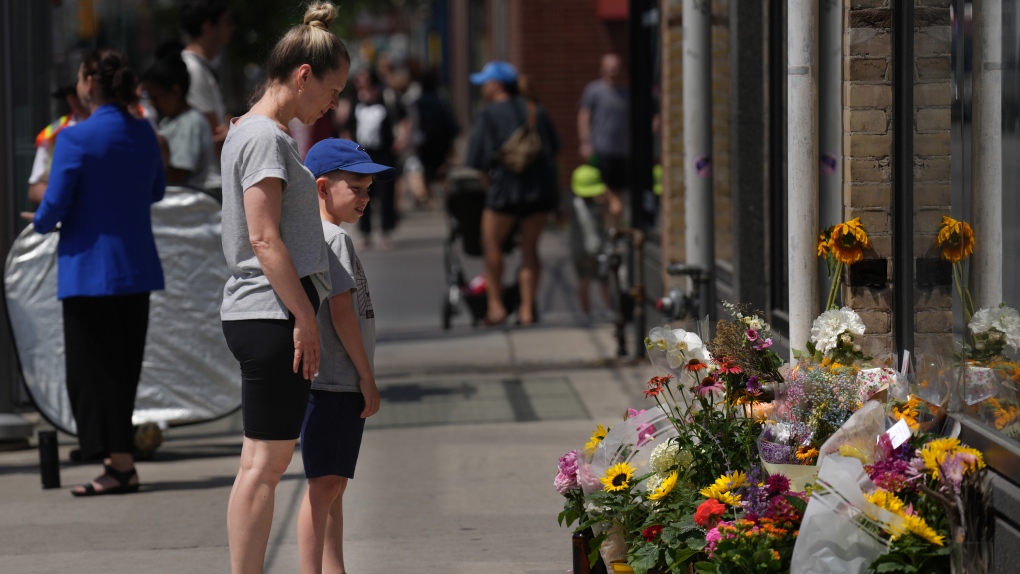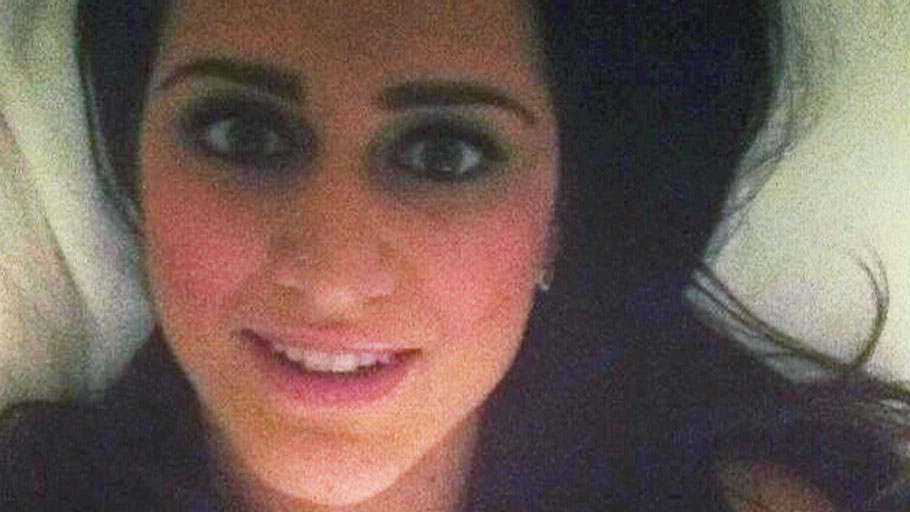Sister of woman killed by stray bullet in 2014 calls latest Toronto bystander shooting 'senseless'
When Lana Loncar first heard about a shooting in Leslieville last week that claimed the life of a mother of two, her first thought was, “Here we go again,” she said.
Nearly nine years after her sister Jelena was killed by a stray bullet outside a now-shuttered downtown nightclub, she said she and her family continue to grieve the tragic loss.
- Download our app to get local alerts on your device
- Get the latest local updates right to your inbox
“Another life lost to absolute senseless violence,” Loncar said of 44-year-old Karolina Huebner-Makurat, who was struck and killed by a stray bullet while walking near Queen Street East and Carlaw Avenue last Friday afternoon.
“I can’t imagine what her kids must be going through,” she said.
Loncar said the only thing that has helped ease the pain of her sister’s murder, if only “slightly,” is time.
“Hopefully they have tight knit family that they can lean on each other through this and with time, they will find some peace.”
On Thursday, police announced that the one of three suspects wanted in connection with the shooting that killed Huebner-Makurat had been arrested and charged with second-degree murder. Two suspects are still outstanding.
 Passers-by stop to look at a makeshift memorial at the place where a mother of two, Karolina Huebner-Makurat was killed by a stray bullet last Friday, in Toronto, Monday, July 10, 2023. THE CANADIAN PRESS/Chris Young
Passers-by stop to look at a makeshift memorial at the place where a mother of two, Karolina Huebner-Makurat was killed by a stray bullet last Friday, in Toronto, Monday, July 10, 2023. THE CANADIAN PRESS/Chris Young
Loncar said she hopes this case has a more successful outcome than her sister’s.
Jelena Loncar, 32, was killed by an unidentified gunman outside C Lounge, located near Wellington and Portland streets, in the early morning hours of Aug. 26, 2014.
She had just finished working a shift at a nearby restaurant and went to the nightclub to wish a friend a happy birthday.
“I guess she made it there when it was already past last call and so she waited for her (friend) outside,” her sister told CP24.com in an interview on Tuesday.
A short time later, an altercation broke out in front of the bar and when gunfire erupted, Jelena was struck and killed.
“My sister wanted to go out after work. She didn’t think it was going to be a dangerous evening,” Loncar said.
So far, there has not been enough evidence to make an arrest in the case.
“It was late at night. The cameras around were pretty crappy and yes there were tonnes of people around, but when guns start going off, people don’t really look where the bullets are coming from. They just run,” Loncar said.
Detectives involved in the case, she said, have also indicated that some key witnesses were not cooperative.
“The detectives, I haven’t even heard from them in well over two years,” she said, adding that there have been no recent updates in the investigation, which is now considered to be a cold case.
Since Jelena’s murder in 2014, there have been several more innocent bystander shootings in Toronto, including two that have gone from active investigations to cold cases.
In August 2015, 26-year-old Ariela Navarro-Fenoy was struck and killed by gunfire outside of Muzik nightclub on the grounds of Exhibition Place after shots rang out at an OVO Fest after-party. Police said at the time that they did not believe she was the intended target of the shooting and to date, her murder has not been solved.
 Ariela Navarro is seen in an image posted on crowdfunding site GoFundMe.com
Ariela Navarro is seen in an image posted on crowdfunding site GoFundMe.com
In August of the following year, 61-year-old Peggy Ann Smith was killed after nearly a dozen shots were fired in broad daylight in the residential area of Dundas and Munro streets in Riverdale. At the time, Smith was visiting with her daughter and two of her grandchildren. No arrests have been made in her murder.
'WE WILL NEVER GIVE UP ON THESE CASES'
Acting Det.- Sgt. Steve Smith, of the Toronto Police Service’s cold case unit, said an investigation is typically classified as a cold case if it is more than four years old, all investigative leads have been followed up on, and the lead investigator has requested that the case be transferred to the unit.
Smith said there about 800 cold cases being investigated by the squad, which consists of one detective, three detective constables, and three genetic genealogists.
“We usually have just over 300 cases that we actively follow up on an investigative lead, or a tip, or a new science technique… over the course of a year,” he said in an interview with CP24.com on Thursday.
“We have a very good system where we keep the mill running. We keep looking at each case as we have time.”
He said he understands the frustration that some families feel when the cases remain unsolved for long periods of time.
“We understand their pain and we understand their frustration in not having answers sooner but everyday we are re-looking at these cases and with the advances in science and the advances in technology we have… we are going to solve as many of these cases as we possibly can,” he said.
“If we can solve their case and bring at least a little bit of closure to the families, we will. We will never give up on these cases.”
He said since he joined the unit five years ago, they have solved about 10 homicides, mostly with the assistance of investigative genetic genealogy.
“The two things that are big in cold case investigations are changes in science and changes in relationships,” Smith said.
“(This includes) people that were maybe in a different lifestyle or a different type of relationship at the time and over the passage of time, they have grown apart from these people and they are willing to come forward give us information on what occurred back a number of years ago,” he said.
'SHOOTINGS ARE COMPLICATED'
Det.-Sgt. Brandon Price, who works in the Toronto Police Service’s homicide unit, acknowledged that gun-related homicides can be challenging to solve.
“Shootings are complicated cases for sure,” he said.
“They can be from such a long distance. Sometimes it takes a while even to find out where the shooting itself occurred,” he said, adding that in a drive-by shooting, investigators may not even be able to find a shell casing.
In the case of Jelena Loncar’s murder, Price, who was only involved in the investigation in the very early stages, said he remembers there being an issue with video surveillance footage.
“It happens a lot. It’s uncanny sometimes how like the one camera that would be pointing right at the situation happens to not be working or died the week before. That kind of stuff just happens and it so strange. Just such bad luck sometimes,” he told CP24.com.
He said even though a case has gone cold, there is still hope that it can be solved.
“Witnesses come forward out of the blue. There is a well documented history of that taking place,” Price said.
“It ends up being a waiting game once you’ve exhausted all of the available avenues of investigation.”
Smith noted that the police service could be on the cusp of a major breakthrough when it comes to investigating gun-related homicides.
“We are in the process of developing new techniques to actually extract DNA from spent shell casings so if we are able to get that to the stages where it is viable and it is acceptable in court, that is going to open a whole other huge element of the shootings to be able to re-investigate as well,” he said.
Loncar said as she and her family wait for justice, it is disheartening to see these incidents continuing to happen on Toronto streets.
 Jelena Loncar, 32, was shot outside a nightclub near Wellington Street and Spadina Avenue, Tuesday, Aug. 26, 2014.
Jelena Loncar, 32, was shot outside a nightclub near Wellington Street and Spadina Avenue, Tuesday, Aug. 26, 2014.
“Obviously we need stricter gun laws,” she said.
Loncar said she still suffers from depression due to the loss of her older sister, who she described as having “the biggest heart of anyone” she has ever met.
“She would literally give you the shirt off her back,” she said. “If it was your birthday, she is baking a cake, she is bringing you the balloons, she’s throwing you the party.”
In the wake of Huebner-Makurat’s murder last week, Toronto Mayor Olivia Chow said addressing gun violence in the city is “a top priority” for her.
“People in our city deserve to be safe, they deserve to feel safe,” she told reporters this week.
“The challenge before me when I become mayor is to find ways to end gun violence and all types of violence in our city so that tragedies like this one do not happen.”
CTVNews.ca Top Stories

Labour minister unveils steps to end Canada Post strike
Canada Post workers began their strike four weeks ago, halting mail and package deliveries across the country. Labour Minister Steven MacKinnon said he hopes work will resume as early as next week.
Canada's homicide rate down in most provinces, with 2 exceptions
The homicide rate is declining in Canada, and the country's three largest cities all saw double-digit percentage decreases in homicides per capita, according to data released this week.
'They believe in diplomacy, good luck': Doug Ford doubles down on energy threat as some premiers distance themselves
Doug Ford is standing behind his threat to stop providing the U.S. with electricity in response to president-elect Donald Trump's promised tariffs, even as several other premiers publicly distance themselves from the stance.
'Little girl deserves justice': Gallery erupts in anger as charges stayed against driver who killed child
In a tense courtroom, a judge stayed the charge against a Saskatoon woman who hit and killed a nine-year-old girl.
Dreaming of a white Christmas? Here are the Canadian cities where snow has been a sure thing
With fewer than two weeks remaining until Christmas Day, weather forecasts and snowfall projections are starting to take shape but have yet to be finalized for cities across Canada.
Skier who went missing at Sun Peaks Resort found dead
In a tragic turn of events, the 68-year-old man who went missing while skiing at Sun Peaks Resort earlier this week has been found dead, the RCMP confirmed Friday.
Mysterious googly eyes go viral after appearing on public art in Oregon
Googly eyes have been appearing on sculptures around the central Oregon city of Bend, delighting many residents and sparking a viral sensation covered widely by news outlets and featured on a popular late-night talk show.
'He was done with shopping': Video shows dog laying on horn in B.C. mall parking lot
Malls can be hectic around the holidays, and sometimes you just can't wait to get home – whether you're on two legs or four.
Ottawa to remove 30% investment cap for Canadian pension funds
Finance Minister Chrystia Freeland says the upcoming fall economic statement on Monday will remove the cap that currently restricts Canadian pension funds from owning more than 30 per cent of the voting shares of a Canadian entity.
































